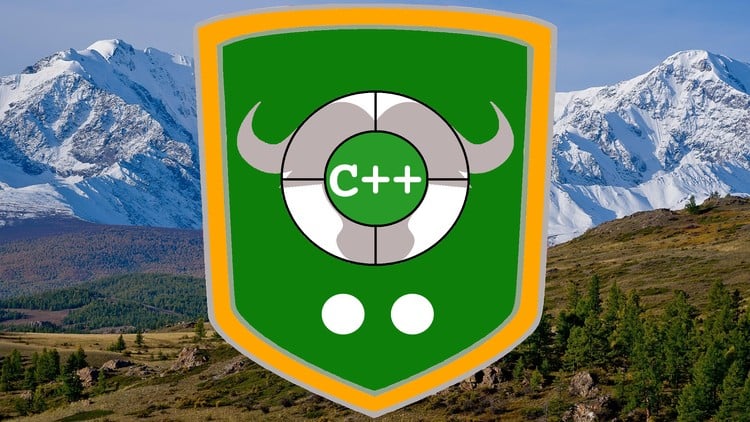
The C/C++ Transition
Why take this course?
🎓 C/C++ 2000: GNU For Intermediate Students – Master the Legacy & Modernize Your Skills
Course Overview:
Dive deeper into the world of C and C++ with our intermediate course, C/C++ 2000, tailored for students who have already grasped the basics. This course builds upon the knowledge from GNU C/C++ 1000 and ensures a comprehensive understanding of the modern C standard. It’s time to appreciate the timeless classics while embracing contemporary programming practices!
Key Features of the Course:
- Language Proficiency: A thorough review of the complete keyword set as per the latest C standards.
- Legacy Code Mastery: Learn how to navigate and work with legacy code, understanding its intricacies and why it remains relevant in today’s technology landscape.
- Core Concepts Reinforced: If you’re new to C/C++, we start with a solid foundation before advancing to intermediate topics.
- Intermediate Complexities: For those already familiar with the basics of C and basic C++, this course offers an engaging dive into more complex subjects.
- State Machine Deep Dive: A revisit of concepts presented in the C/C++ 1000 series, now with a focus on state machines.
Course Structure:
- Rolling Review & Beyond: We kick off this course by ensuring you have a firm grasp of the core concepts through a rolling review. This sets the stage for the extended topics we’ll explore in this intermediate level curriculum.
- Hands-On Learning: Through practice and application, you’ll solidify your understanding of C/C++ constructs, ensuring that you’re not just learning but truly mastering the material.
Learning Objectives:
- Comprehensive Understanding: Achieve a deep understanding of the C/C++ language features as per modern standards.
- Versatility in Programming: Gain the ability to work with a diverse range of code bases, from legacy systems to cutting-edge applications.
- Problem Solving Skills: Learn how to apply your knowledge effectively to solve complex problems using state machines and other advanced concepts.
Why Enroll in C/C++ 2000?
- Multiple Perspectives: We present key concepts through various lenses, ensuring a robust understanding of the subject matter.
- Mastery Through Repetition: By revisiting topics from the C/C++ 1000 series, we reinforce learning and help you master each concept.
Who Should Take This Course?
This course is ideal for:
- Intermediate Programmers: Those who have completed a basic C/C++ course and are looking to deepen their understanding.
- Software Developers: Professionals aiming to transition from working with legacy systems to modern C/C++ applications.
- Lifelong Learners: Individuals passionate about C/C++ who wish to expand their knowledge and skills.
Enhance Your C/C++ Skills Today!
Join us on this journey through the intricacies of C/C++ with C/C++ 2000: GNU For Intermediate Students. Whether you’re looking to bridge the gap between legacy and modern coding, or simply wish to challenge yourself further, this course is your pathway to expertise. Let’s embark on this learning adventure together!
🔤 Note: If you haven’t taken our introductory course GNU C/C++ 1000, it might be beneficial to enroll in it as a precursor to C/C++ 2000. This will provide you with the foundational knowledge required for a smooth transition into this intermediate course.
- Mastering the C/C++ Dichotomy: Explore the historical and technical bridges between C and C++, understanding how C++ evolved from C and how to leverage both languages effectively.
- Advanced C Constructs and Idioms: Delve into more complex C programming techniques, including pointer arithmetic, dynamic memory management beyond basic `malloc`/`free`, bitwise operations for efficiency, and structured error handling.
- Object-Oriented Design with C++: Gain a deep understanding of classes, objects, inheritance, polymorphism, and encapsulation, learning to design and implement robust object-oriented solutions.
- C++ Standard Library Essentials: Become proficient with key components of the C++ Standard Template Library (STL), including containers (vectors, lists, maps), algorithms, and iterators, for streamlined development.
- Effective Use of GNU Tools: Navigate the power of the GNU toolchain, including `gcc`/`g++` for compilation, `gdb` for debugging complex issues, `make` for automated builds, and other utilities for efficient software development.
- Memory Management Nuances: Understand the intricacies of memory allocation and deallocation in both C and C++, including stack vs. heap, memory leaks, dangling pointers, and best practices for preventing memory-related bugs.
- Introduction to Templates and Generics: Explore the foundational concepts of C++ templates, enabling the creation of generic code that can operate on different data types without sacrificing type safety.
- Exception Handling Strategies: Learn to implement robust error handling mechanisms in C++ using `try`, `catch`, and `throw`, ensuring graceful recovery from runtime errors.
- Performance Optimization Techniques: Discover methods for optimizing C and C++ code for speed and memory efficiency, including compiler flags, algorithmic improvements, and data structure choices.
- Interoperability Between C and C++: Understand how to seamlessly integrate C and C++ codebases, managing function call conventions and data type compatibility.
- Building Command-Line Applications with GNU Make: Develop proficiency in using `make` to automate the compilation and linking process for multi-file C/C++ projects, enhancing development workflow.
- Debugging Techniques with GDB: Master the art of debugging C/C++ programs using `gdb`, including setting breakpoints, inspecting variables, stepping through code, and analyzing core dumps.
- PROS:
- Bridging Foundational Knowledge Gaps: This course is ideal for those with some C exposure looking to transition smoothly into C++ or for C++ developers wanting to solidify their C understanding.
- Practical, Tool-Driven Learning: Emphasis on the GNU toolchain provides hands-on experience with industry-standard development tools.
- Foundation for Advanced Topics: Establishes a strong base for further exploration into areas like system programming, game development, and high-performance computing.
- CONS:
- Potential for Information Overload: Covering both C and C++ with advanced GNU tools within a single intermediate course could be demanding for some learners.